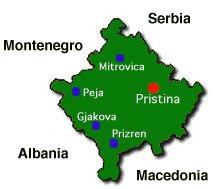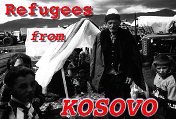| In the year 1389 the Ottomans under Murad I and his son Bayezit I inflicted heavy casualties on the Serbian army, and as a result the Byzantine Christian empire was surrounded by the Moslem Ottoman forces. In 1448 Hungarian Christian crusaders under János Hunyady tried to invade Kosovo to free it from Islam, but were defeated by the Turks under Murad II.
These two defeats weigh heavily on the history of the Christian Orthodox Serbs, who consider Kosovo, definitively occupied by the Slav ancestors of the Serbs in the sixth century B.C., as the heartland of their culture.
But the Albanians too, who represented about 88% of the population of Kosovo before the operations of ethnic cleansing perpetrated by Slobodan Milosevic, consider the territory of Kosovo as their homeland. They trace their roots back to the Illyrian civilisation, a tribe of Indo-European origin which inhabited the region known as Illyria before the advent of the Romans. These tribes were notorious for their piratical raids, which Rome decided to put a stop to by subduing the territory in 27 B.C. The region has also remained famous in history as the birthplace of three Roman Emperors: Aurelian, Constantine and Diocletian. | 
| | Population: | 2,100.000 | | Albanians: | 87.8 % | | Serbs: | 6.6 % | | Other: | 5.6 % | | Birth rate: | 2.8 % | | Source: dr. Hivzi Islami, 1993 | | | | | In 1989 the Moslem majority of Albanian origin protested because the Belgrade government imposed martial law on the then independent province. The autonomy of Kosovo was subsequently revoked, and in 1991 the Albanian majority voted in favour of a secession from the Yugoslav federation and Serbia, seeking annexation with nearby Moslem Albania.
In reply the Belgrade government tightened the noose, taking over political control and that of the armed forces and state institutions in the previously independent province. The official line was that this was done to protect the Serb minority of 200,000 inhabitants, which claimed persecution at the hands of the Albanian majority (1,900,000 individuals). According to the Serbs, the reason for the large number of Kosovars of Albanian origin, which became a majority after the Second World War, is the high birth-rate among the ethnic Albanians, close on 3%. Milosevic used the Kosovo situation to whip up nationalism, and to plan and carry out the operation of ethnic cleansing.
|

